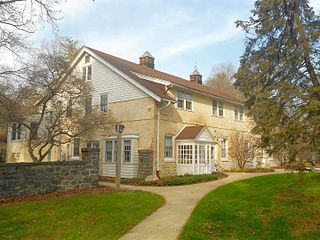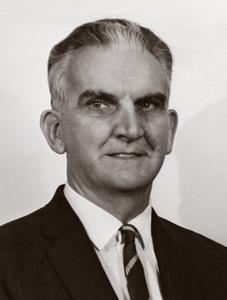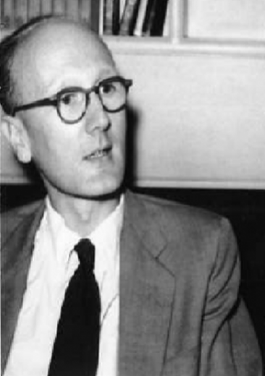Related Research Articles

The Friends' Ambulance Unit (FAU) was a volunteer ambulance service, founded by individual members of the British Religious Society of Friends (Quakers), in line with their Peace Testimony. The FAU operated from 1914 to 1919, 1939 to 1946 and 1946 to 1959 in 25 countries. It was independent of the Quakers' organisation and chiefly staffed by registered conscientious objectors.

Charles Eugene Fager, known as Chuck Fager, is an American activist, author, editor, publisher and an outspoken and prominent member of the Religious Society of Friends or Quakers. He is known for his work in both the Civil Rights Movement and in the Peace movement. His written works include religious and political essays, humor, adult fiction, and juvenile fiction, and he is best known for his 1974 book Selma 1965: The March That Changed the South, his in-depth history of the 1965 Selma Voting Rights Movement, which led to the passage of the Voting Rights Act.

William Penn University is a private university in Oskaloosa, Iowa, United States. It was founded by members of the Religious Society of Friends (Quakers) in 1873 as Penn College. In 1933, the name was changed to William Penn College, and finally to William Penn University in 2000.
Young Friends General Meeting (YFGM) is the national organisation for young Quakers in the United Kingdom. The name refers both to the organisation and to the General Meetings which are held in February, May and October each year, in various Quaker Meeting Houses in Britain. The organization also publishes a tri-annual magazine entitled The Young Quaker.

Within the Religious Society of Friends, a clerk is someone responsible for various administrative functions within a meeting for worship for church affairs or meeting for worship with attention to business. The clerk is responsible for recording the discernment which is arrived at during such a meeting, in a minute, and is responsible for sending and receiving correspondence on behalf of the meeting. Within some branches of the Religious Society of Friends, the clerk may also create an agenda and may facilitate the meeting.

The Religious Society of Friends, commonly known as Quakers, encouraged some values which may have been conducive to encouraging scientific talents. A theory suggested by David Hackett Fischer in his book Albion's Seed indicated early Quakers in the US preferred "practical study" to the more traditional studies of Greek or Latin popular with the elite. Another theory suggests their avoidance of dogma or clergy gave them a greater flexibility in response to science.

Henry Joel Cadbury was an American biblical scholar, Quaker historian, writer, and non-profit administrator.
Samuel Bownas (1676–1753) was a Quaker travelling minister, and writer. He lived in the Lancaster and Dover areas of England. His book A Description of the Qualifications Necessary to a Gospel Minister is used to inform Quaker ministry to this day.

Pendle Hill is a Quaker study, retreat, and conference center located on a 24-acre (9.7 ha) campus in suburban Wallingford, Pennsylvania, near Philadelphia. It was named for Pendle Hill in Lancashire, England, that the first Quaker preacher described as the site of his calling to ministry. Founded in 1930, Pendle Hill offers programs open to people of all faiths. These programs include residential study programs, online and on-campus short-term courses and retreats, conference services, publications, leadership training, a walk-in bookstore, hybrid daily meeting for worship, dining services, and a bed and breakfast.

Quakers are people who belong to the Religious Society of Friends, a historically Protestant Christian set of denominations. Members refer to each other as Friends after John 15:14 in the Bible, and originally, others referred to them as Quakers because the founder of the movement, George Fox, told a judge to quake "before the authority of God". The Friends are generally united by a belief in each human's ability to be guided by the inward light to "make the witness of God" known to everyone. Quakers have traditionally professed a priesthood of all believers inspired by the First Epistle of Peter. They include those with evangelical, holiness, liberal, and traditional Quaker understandings of Christianity, as well as Nontheist Quakers. To differing extents, the Friends avoid creeds and hierarchical structures. In 2017, there were an estimated 377,557 adult Quakers, 49% of them in Africa followed by 22% in North America.

Kenneth Ewart Boulding was an English-born American economist, educator, peace activist, and interdisciplinary philosopher. Boulding was the author of two citation classics: The Image: Knowledge in Life and Society (1956) and Conflict and Defense: A General Theory (1962). He was co-founder of general systems theory and founder of numerous ongoing intellectual projects in economics and social science. He was married to sociologist Elise M. Boulding.
A Book of Discipline may refer to one of the various books issued by a Yearly Meeting of the Religious Society of Friends, setting out what it means to be a Quaker in that Yearly Meeting. The common name for this book varies from one Yearly Meeting to another and includes Book of Discipline, Faith and Practice, Christian Faith and Practice, Quaker Faith and Practice, Church Government and Handbook of Practice and Procedure. Each Book of Discipline is updated periodically by each Yearly Meeting according to the usual practice of decision making within the Religious Society of Friends.
Howard Haines Brinton (1884–1973) was an author, professor and director whose work influenced the Religious Society of Friends movement for much of the 20th century. His books ranged from Quaker journal anthologies to philosophical and historical dissertations on the faith, establishing him as a prominent commentator on the Society of Friends.
Quaker Life is a central department of the Yearly Meeting of the Religious Society of Friends (Quakers) in Britain, the national organisation of Quakers in England, Wales, Scotland, the Isle of Man and the Channel Islands. Its work is to develop the spiritual life of Quakers in Britain, and the running of Quaker Meetings within Britain.
Dorothy Nimmo was an English poet, winner of the Cholmondeley Award in 1996.
Margaret Hope Bacon was an American Quaker historian, author and lecturer. She is primarily known for her biographies and works involving Quaker women’s history and the abolitionist movement. Her most famous book is her biography of Lucretia Mott, Valiant Friend, published in 1980.

Sarah Fell (1642–1714) was an English Quaker accountant and writer at Swarthmore Hall. She was the daughter of Margaret Fell and Thomas Fell, and the eventual stepdaughter of George Fox.

Sydney Dawson Bailey was an English author, pacifist, and expert on international affairs. He worked at and was head of the Quaker United Nations Office during the 1950s. He was a conscientious objector during World War II, and spent several years in the Friends' Ambulance Unit. Bailey wrote 17 books and worked at the Carnegie Endowment for International Peace from 1958 to 1960 as a visiting scholar. He then left the endowment and was involved in various negotiations and advisory councils before his death in 1995.

Hannah Jenkins Barnard was a Quaker minister from Dutchess County, New York. Early in her career, she was active throughout New York and then New England. She was considered an "eloquent speaker" and was esteemed among fellow Quakers. She became interested in traveling across the Atlantic Ocean to speak at meetings in England, Ireland, and Scotland. Because she was a woman, it took two years before she received approval for the trip.
Margarethe Lachmund was a German resistance fighter against Nazism, and peace activist. She belonged to the Religious Society of Friends.
References
- ↑ Biographical information from the cover of Mending hurts. Date of birth and publications list from the catalogue of the Library of the Religious Society of Friends, Euston, with the exception of If stones could speak listed on the cover of Mending Hurts.
- ↑ Hope Project website
- ↑ Peace teams News SUMMER, 2001: Volume 6, Issue 2